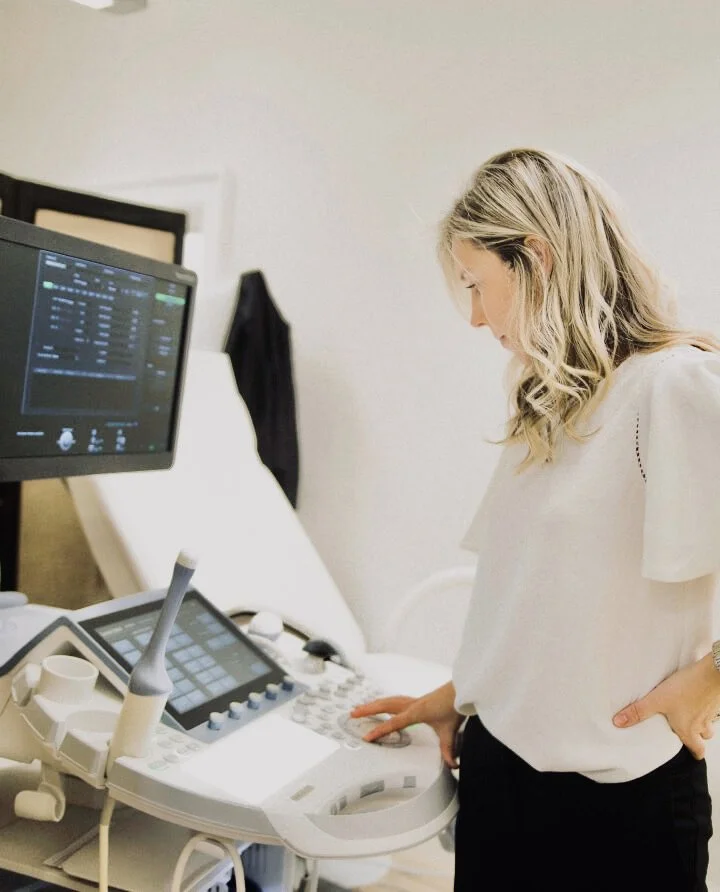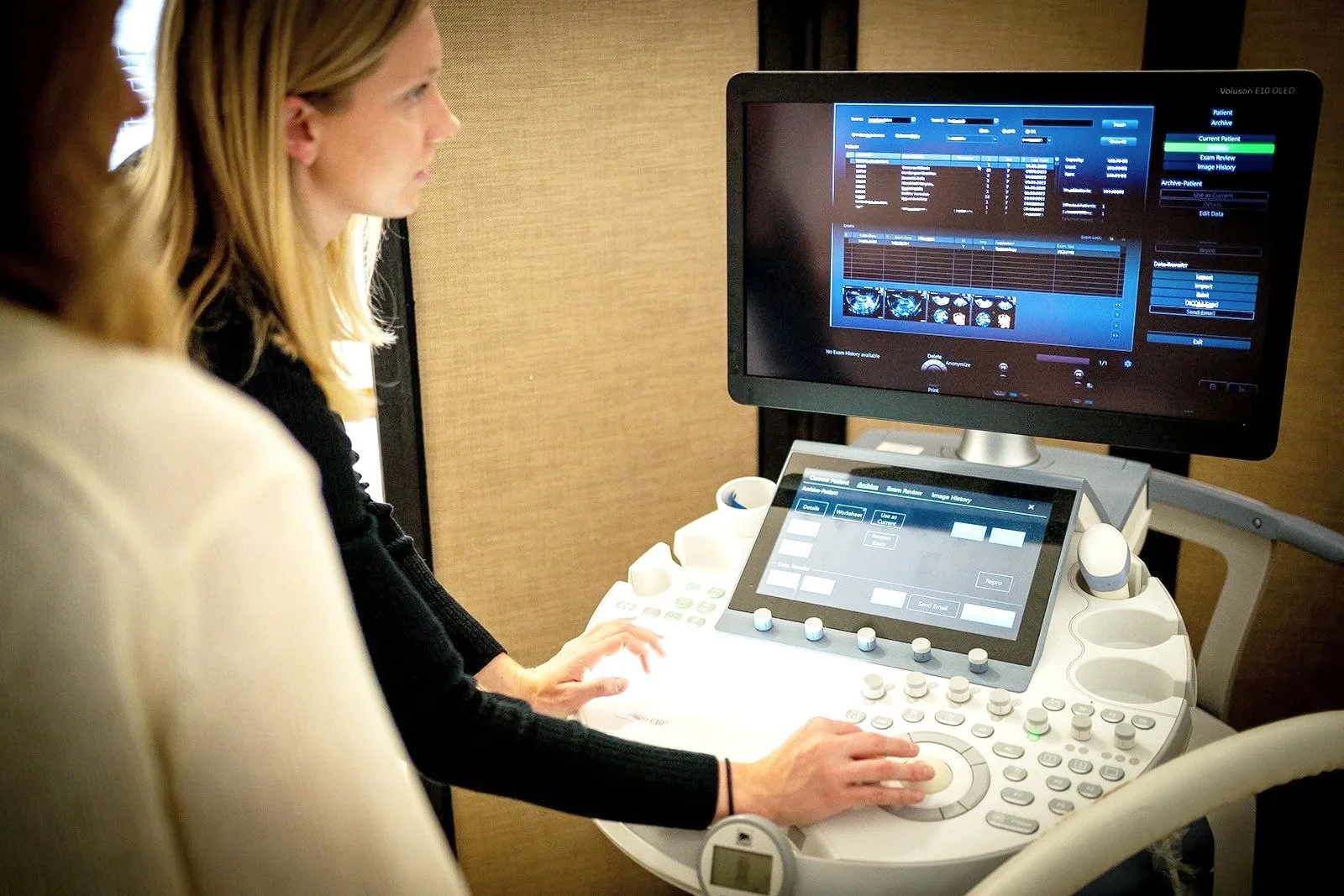
LCRH
Female Fertility Testing
Testing Your Fertility
What is a Female Fertility Check?
A female fertility check (also known as an Ovarian Reserve Test) comprises two parts:
1) A simple blood test that measures a hormone known as Anti-Mullerian Hormone (AMH). The level of AMH in your blood helps us to assess how many eggs you may still have. It also helps to measure how many eggs may be collected during an egg-freezing treatment cycle if you were to choose to go down this route.
2) A transvaginal ultrasound scan to perform an Antral Follicle Count (AFC). This assesses the number of antral follicles (small, fluid-filled sacs containing eggs) in the ovaries. It can also check for any endometrial polyps, fibroids, ovarian cysts or other problems likely to affect fertility.

"I was always listened to carefully and intently, never feeling rushed or that I was just a number. Every member of Lynne's team knows me by name, history and medical care, and even my little dog, Autumn, gets asked after."
- V
Patient Reviews
Why should I have a female fertility check?
Girls are born with a fixed number of immature eggs in their ovaries. The number of eggs decreases as women get older. At birth, most girls have about 2 million eggs, at adolescence that number has gone down to about 400, 000, at age 37 there remain about 25,000. By age 51 women have about 1000 immature eggs but these are not fertile.
At the beginning of each menstrual cycle, the ovaries recruit several antral follicles. One of them will develop into a mature egg which, when the time comes, will be released at ovulation. At this point the remaining antral follicles receive a hormonal message to disappear (die) and get re-absorbed into the body. Approximately 1000 antral follicles (and the eggs within them) die each month as part of the normal process of follicular atresia.
What happens to eggs as a Woman gets older?
The quality of the eggs also reduces as a woman get older. All other things being equal the number and quality of a woman’s eggs determines her fertility.
You may not yet know if you want to have children at all, or if you do, you may not know when that might be. Whether you’re busy with your career, waiting to find the right partner or simply enjoying life as it is, waiting to have children is very common.

“Fertility Assessments can give you the insights and knowledge about your body to make the choices which work for you.”
- Dr Lynne Chapman
What should I do if I have concerns about waiting to conceive?
If you have any concerns about waiting to conceive, and what that might mean for your chances, getting a fertility check is a great way to help you prepare for your future.
When should I start testing my fertility?
The ideal age to start testing fertility can vary depending on several factors, including individual circumstances and any existing concerns. However generally speaking, as a woman, the best age to start testing your fertility is between 28 and 35 years old.
From your late twenties, fertility starts to decline. Taking a fertility test sooner rather than later can help you to understand your fertility status, know your options and make informed decisions about when to start a family.
If you aren’t ready to have children yet, positive results can give you peace of mind. Knowing that you’re in good reproductive health will put your mind at ease until the time is right for you.
On the other hand, if there are any concerns raised by an Ovarian Reserve Test or a family history of premature ovarian failure, you have time to make certain lifestyle changes. Factors including smoking, alcohol consumption, poor diet, high BMI and stress can all impact your fertility, and by taking a test early on, you have time to resolve those issues before you start trying to conceive.
What is perimenopause?
1 in 100 women will go through the menopause by the time they turn 40. 50% of women experience perimenopausal symptoms in their 30s. Yet, because menopause is still considered something that only affects older women, younger women are suffering in silence, sometimes not even knowing that they are perimenopausal, enduring severe perimenopausal symptoms and, in some cases, undiagnosed subfertility.
If your results show signs of any underlying fertility issues, we may recommend medical intervention or treatment. This may include freezing your eggs while you’re at a younger age. Egg freezing is becoming an increasingly popular option for women who want to preserve their fertility and improve their chances of conceiving later.
Why is the scan transvaginal and will it hurt?
We at LCRH are fully aware that a transvaginal scan can be an invasive and uncomfortable experience. We will never down play these concerns but our highly trained team will make every effort to make this investigation as comfortable as possible. A transvaginal ultrasound provides a more detailed view of the ovaries and surrounding pelvic organs than an abdominal scan because the ultrasound probe is positioned closer to the ovaries, minimizing interference from other tissues and structures.
What happens after I have an AMH test?
Once your AMH test has been carried out (either by visiting a clinic or through an at-home fingerprick test), you will attend a consultation with a fertility specialist who will conduct the ultrasound scan. They will discuss your test results and advise you on any lifestyle changes that may be required to improve your health and your fertility.
Should you wish to, the specialist will also be able to discuss your options regarding freezing your eggs, and any future assistance that may be needed to help you conceive.
At LCRH, our friendly team will support you throughout the entire process, ensuring that you feel informed and supported every step of the way.
How do I interpret the results of an AMH test?:
AMH: Lower AMH levels generally indicate a lower ovarian reserve.
AFC: A lower antral follicle count indicates a lower ovarian reserve. A very high AFC can indicate polycystic ovarian mor
What are some important considerations of female fertility testing?
Ovarian reserve testing provides insights into the quantity of eggs, but not necessarily their quality.
A diagnosis of diminished ovarian reserve does not mean a woman cannot conceive or that she will definitely experience pregnancy loss.
Ovarian reserve testing can be useful for women of all ages who are considering delaying pregnancy or those with a family history of premature ovarian failure
Fertility assessment: It helps individuals and couples understand their fertility potential, particularly when considering delaying pregnancy.
Fertility treatment planning: The results inform decisions about appropriate fertility treatments like IVF, including the necessary medication dosages.
Fertility preservation: It can help women decide if they want to freeze their eggs or embryos for future use.

“Every Patient, Every Story, and Every Day is Uniquely Different. Which is why our Care is Too.”
- Dr Lynne Chapman
LCRH has care locations in London, Beaconsfield and Tunbridge Wells
We also have specialist partner laboratories at Lister Fertility Clinic, London, and Aria Fertility Clinic, London.
The LCRH Difference
-
LCRH is 100% founder-owned by Dr Lynne Chapman. Independence from private equity or large corporate ownership gives her small team of experts unconstrained focus on meeting patient needs. Your unique body means your unique informed care.
-
LCRH patients receive a dedicated care team of Consultant, Nurse, and Admin. Your team stays with you throughout your treatment, is continuously updated with developments in your care, and is contactable throughout.
-
Fertility treatment pathways can be long and complex. Fertility treatment pricing must be clearly articulated upfront, transparent and flexible. To the greatest degree possible, we aim to meet these needs through detailed bespoke quotes, FAQs and an easily accessible finance team.
-
We work with a selection of the UK’s most established and respected complementary fertility therapists including dieticians, acupuncturists and coaches.
-
Dr Chapman is a passionate believer that all families are perfect in their own way. For many of our patients the journey to a family involves egg and/or sperm donation. LCRH provides access to and co-ordinates closely with both UK and overseas donor banks and treatment facilities.
-
Dr Chapman and her team have extensive expertise in helping those with previously failed IVF cycles, low ovarian reserves, recurrent pregnancy loss, PCOS, endometriosis, fibroids, and male-factor fertility issues.
-
LCRH works in collaboration with leading HFEA licensed laboratories, and foremost multidisciplinary teams including andrology, surgery, medical and obstetrics.
-
We understand how confusing and stressful trying to conceive can feel. We provide support at every step of the journey. We work closely with highly experienced counsellors throughout.
-
50% of the contribution means 50% of the focus. LCRH is a leader in the research and analysis of male factor fertility. From simple semen analysis and culture to ZyMot, advanced DNA fragmentation testing and surgical sperm retrievals; LCRH works with world renown urologists and andrologists to provide the best possible outcomes.
-
LCRH extends a compassionate and diversity-positive approach to all. We offer a welcoming smile and the full range of treatment options for all versions of the modern family.
To learn more, book a consultation, or schedule an informal chat about your personal situation with an experienced member of our admin team please use the link below. You can also reach us by phone and WhatsApp.












